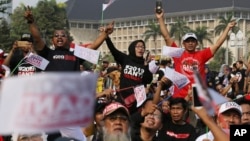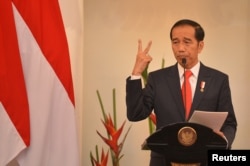Tens of millions of Indonesian voters headed to the polls under tight security on Wednesday to cast ballots in regional elections across the world’s third-largest democracy and biggest Muslim-majority country.
The elections for 171 city mayors, regents, and provincial governors are likely to set the tone for national parliamentary and presidential elections in 2019, with some hardline Islamic leaders now publicly calling for the ousting of President Joko Widodo, who is expected to seek a second term. Widodo has pledged to protect Indonesia's tradition of pluralism and moderate Islam.
Indonesia is on high alert after a series of suicide attacks in Surabaya city killed 30 people last month, in the deadliest militant Islamist attacks in over a decade.
National police and military have deployed thousands of personnel to secure the polls, as voters cast ballots in polling booths set up in schools, town halls, and outdoor tents.
"We are carrying out regular police operations and we have deployed 171,000 alongside the military," said national police spokesman Setyo Wasisto.
Last week, one of Indonesia's highest-profile Islamic State supporters was sentenced to death for his involvement in a series of attacks, and experts have warned of a risk of retaliatory attacks from his supporters.
More than 160 million people are registered to vote and over half of them are on the island of Java, where West Java province's population of 47 million alone is roughly equivalent to Spain.
Opinion polls suggest candidates backed by parties supporting president Widodo will win in key provinces like West Java, but observers will be watching for signs of Islamist influence after a bitterly fought and divisive contest for the Jakarta governorship last year.
In 2017 opposition parties allied with Islamist groups to lead protests that culminated in the election defeat and jailing for blasphemy of Jakarta's ethnic-Chinese and Christian governor, Basuki Tjahaja Purnama -- an Widodo ally.
A strong showing in this week's regional elections would be a boost for next year's presidential election, which is expected to be a re-run of the 2014 contest between Widodo and retired general Prabowo Subianto.
Polls open at 7 am and stay open for six hours. Quick counts, based on early counting of a sample of votes, are expected to start coming in a few hours after polls close and have previously given an accurate assessment.
The National Election Commission is expected to announce official results on July 9.






